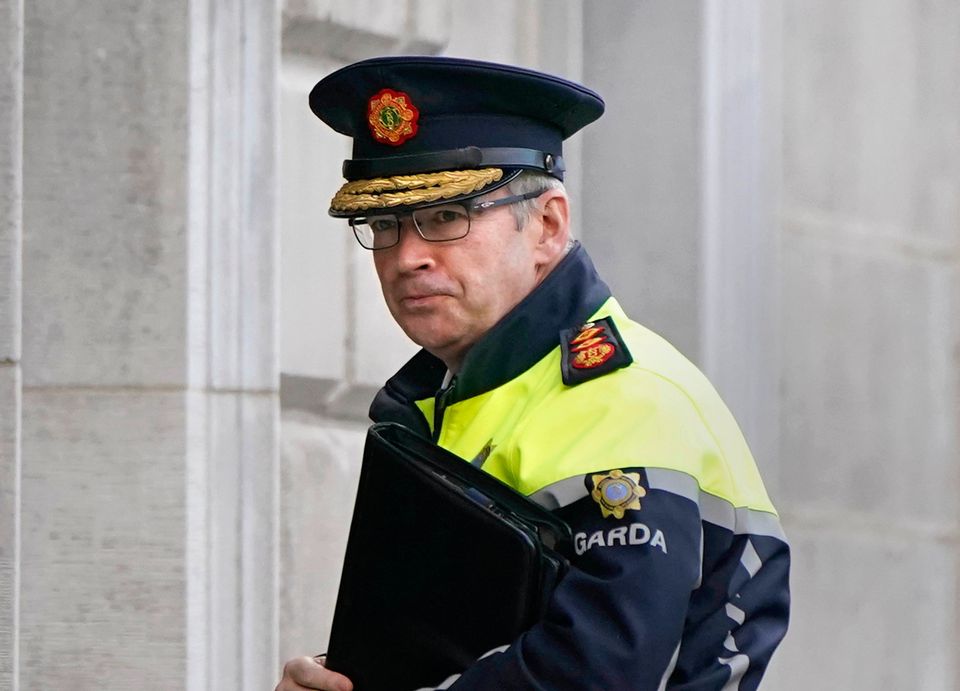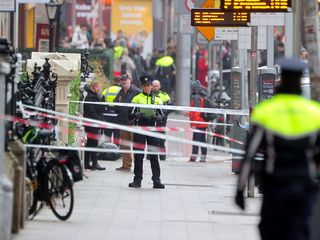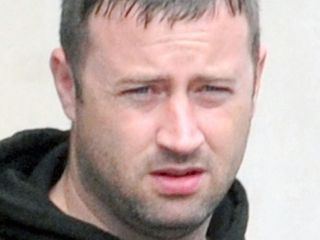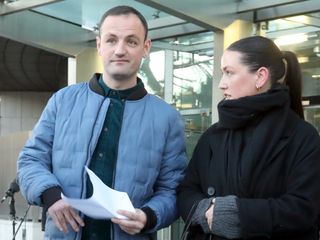- Home >
- Crime >
- Irish Crime
Gardaí in Dublin will have body-cams by spring, as commissioner says he won’t resign
Drew Harris commented: “I have too much work to do, and part of that is responding to this, so I have no intention of resigning."
Drew Harris says he has 'no intention of resigning'
Garda Commissioner Drew Harris has told the Dáil Justice committee: “I am not going to resign. I care too much about this job.”
He commented: “I have too much work to do, and part of that is responding to this, so I have no intention of resigning."
Former Justice minister Michael McDowell said he was glad to hear it. Some of those calling for his resignation had used "violent disorder as a tactic in the past, and I won't say further than that," he commented.
Commissioner Harris said it would have been an "impossible and forlorn task" to attempt to do more earlier on last Thursday, but denied to Sinn Féin TD Louise O'Reilly that the gardaí had lost control.
Asked by Fine Gael TD Colm Brophy if "violent emerging protests" would be dealt with quicker in future, the Commissioner replied: "The simple answer to that is yes," referencing water cannon and Taser, and the issuing to all gardaí of "incapacitating spray."
Mr Harris said he was in contact with senior officials in the Department of Justice last Thursday afternoon, but was primarily engaged in "direction and control" of An Garda Síochána.
Garda Commissioner Drew Harris arriving to appear before the justice committee at Leinster House following riots in Dublin last week. PA
Read more
Asked about contact with Minister Helen McEntee, he said he met the minister at the Department of Justice at 8pm. He first became aware of the stabbing incident at 2.19pm and drove back to Dublin from an engagement in Waterford. He then had his "first communication with the minister" [McEntee] at 2.49pm.
In a statement on Wednesday evening, Justice Minister Helen McEntee, who has also come under intense pressure over the response to the riots in Dublin, said legislation allowing gardaí to use body-cams has now passed, and gardaí in Dublin city would have the cameras by spring, along with greater access to CCTV footage.
Once enacted the legislation will be accompanied by laws allowing gardaí to use facial recognition technology.
She also said the latest class of 151 Garda graduates would be attested early, before Christmas, with 700 to 800 new recruits in the Garda College this year.
“The Minister also welcomed the series of announcements from Commissioner Harris and the senior leadership team of An Garda Síochána today, including the accelerated expansion of the Garda Dog Unit – as provided for by Minister McEntee in Budget 2024,” the statement read.
“Other measures include the provision of stronger incapacitating spray for all Gardaí; the provision of tasers to public order units, subject to training; more public order training for Gardaí; more and improved public order equipment and vehicles; more Garda data scientists to support the analysis of evidential material; the purchase of hand held video cameras for public order units; and the further expansion of public order tactics.”
A total of 135 trainees entered the training college in February, 154 entered in May, 174 entered in July, and another 177 entered the college last month, the largest intake since Covid, the minister said.
“The shocking scenes we witnessed last Thursday night show how crucial bodycams, as well as tools such as Facial Recognition Technology, are to protecting Gardaí and help bring criminals to justice,” the minister said.
“These tough new laws will help An Garda Síochána identify perpetrators and gather evidence directly. It will help them deal with public order and with tackling incitement by the far right.
“But there will also be other benefits this Bill - greater access to Automatic Number Plate Recognition will help with longer term investigations, and reduce the time it takes to collate evidence and track suspects.
“Policing services across the world have gained significant benefits from the introduction of these technologies and I am confident that they will play an important role in improving Garda front-line capabilities and in ensuring the accurate recording of incidents.”
Ms McEntee added: “Particularly in light of the shocking scenes we all witnessed last Thursday night, this Bill and the changes it will make are more important than ever.
“Now that the Bill has successfully completed its final stage, I hope to see it enacted, commenced, and for body-worn cameras to be rolled out as soon as possible.
“I also welcome the Garda Senior Leadership Teams decision on a range of measures to support Gardaí in policing serious public order incidents and conducting criminal investigations in order to keep people safe.
“This includes running a separate proof of concept (POC) project involving the deployment of body-worn cameras in Dublin city centre. The cameras will be used in conjunction with a code of practice developed in line with the Digital Recording Bill.
“This relatively quick technical solution will make Body Worn Cameras available to city centre Gardaí in a shorter timeframe to the main solution by next spring.”
The use of Facial Recognition Technology will be provided for separately in the new Garda Síochána (Digital Management and Facial Recognition Technology) Bill 2023, and some campaigners have questioned the rush to erode civil liberties on the back of the riots.
Minister McEntee said: “I have instructed officials to include riot and violent disorder in the new facial recognition bill which will be ready to go to Government within weeks.
“I have also informed the Cabinet that I have asked An Garda Síochána to consider how to fast track the purchase of Garda bodycams.”
The statement noted that Department of Justice has “engaged extensively with An Garda Síochána, Garda oversight bodies and strategic partners during the preparation of this Bill, as well as the Office of the Data Protection Commissioner, the Irish Human Rights and Equality Commission and the Irish Council for Civil Liberties”.
It added: “The legislation is an overt policing Bill, dealing primarily with recording in public places, and is fully compliant with the GDPR and the accompanying law enforcement directive. Codes of practice will be developed for the use of the various technologies provided for in the Bill and will be included in a Statutory Instrument.”
Earlier at the committee, Senator Vincent P. Martin of the Greens suggested Gardaí lacked riot gear on the day because of an issue with locker space. Anne Marie McMahon, Deputy Commissioner of Policing and Security, acknowledged that some public order members stored their gear at home. Shields were particularly bulky and "space was at a premium" in stations, she said.
The Commissioner said there was "a huge amount" of misinformation on the internet since Thursday, including efforts to set up a further protest. These had been policed and nothing had transpired. There had also been efforts to set up "a false trail," he said. "A lot of what is put up on the internet is nonsense," he added.
Justice committee chairman James Lawless TD asked Commissioner Harris about the lack of foot patrols in Dublin city centre, a point also raised by Senator McDowell.
Mr Harris replied that Operation Citizen was ongoing, and there had been an "uplift" in numbers of gardaí on patrol since the Minister allocated an extra €10 million funding. There would be increased public order and uniform presence over Christmas, with "re-focus on visibility," he said, noting there had been 11,000 arrests in the North and South central areas up to October.
WhatsApp messages were used for public order personnel and to seek overtime, he said. Members were often "mustering themselves," seeing what was going on and knowing they would be called upon.
Resources at Parnell Square East were being constantly built up, while some in uniform went back to their stations to change into public order gear, he said.
Pa Daly, Sinn Féin Justice spokesman, asked about awareness building from social media messages online and whether there was any contingency plan in place.
The school had one itself for a serious incident, he said. The Commissioner said: "We have plans in place for responding to a serious incident." The stabbing of children could not have been foreseen. "Right from the first minute, I knew this was a serious incident." he said, and there had soon been " a huge attempt by rioters to impose anarchy."
"A riot is, in effect, an uncontrollable event," Mr Harris added. At 4pm "we were already supplementing public order numbers." But he said the force did not have sufficient numbers until about 7.30pm to attempt any ‘kettling’, or containment. A difficulty was so many side-streets and alleyways in Dublin city centre.
Alan Farrell TD asked if there was a chilling effect on the use of force. Mr Harris said there were competing rights in this area. "Clarity in respect of that would be welcome, but at the same time we have our own decision-making, which is informed by a code of ethics."
He said the organisation was "short of personnel," lacking 1,000 against Government plans, while it was accepted that the force needed a total of 15,000 members.
"We are an organisation growing, but too small at this moment in time. We want to concentrate more resources in the city centre in terms of visibility... to make it feel a far more safer place to operate."
Mr Harris said: "This was a spontaneous incident. The scale and speed with which misinformation spread, the repeated lies put out there, all added to the tension.
"We would always respond in terms of how the situation developed. There was no prior indication of the scale of this. There was no failure in terms of those dealing with the situation."











































